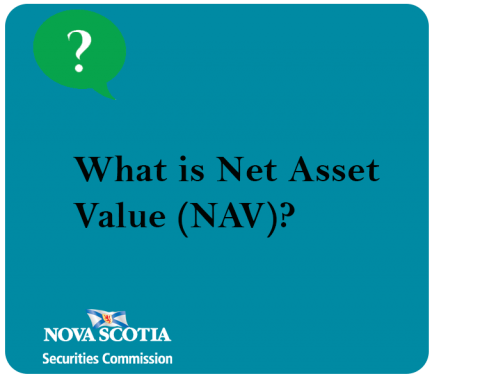Submitted by nsscadmin on

In last week’s blog post on mutual funds and ETFs we mentioned Net Asset Value (NAV). Now a few of our readers want to learn more about it.
Net asset value is the value per share of the mutual fund or ETF on a specific date and time. For mutual funds this is calculated at the end of the day, while for ETFs it can be calculated anytime as they can be traded whenever the markets are open.
So, what makes up a net asset value and how is it calculated? A net asset value is the fund’s assets minus their liabilities divided by the number of outstanding shares. Assets can refer to the total market value of the fund’s investments, any cash and cash equivalents on hand, receivables and accrued income. Liabilities can refer to any short-term and long-term liabilities, and any accrued expenses such as fund manager, administrative and operational expenses.
Here’s an example of a fund’s assets and liabilities and how it is used to calculate its Net Asset Value.
At the end of day our fund’s investments have a total market value of $150 million. They also have on hand $10 million in cash and cash equivalents, $5 million in receivables and $100,000 of accrued income. For liabilities, the fund has $15 million in short-term liabilities and $5 million in long-term liabilities. For accrued expenses, it lists $20,000. The fund currently has 7 million shares outstanding.
Now for the math using the formula (Assets) – (Liabilities) / Outstanding Shares:
|
Investments |
$150,000,000 |
|
|
Cash and cash equivalents |
$10,000,000 |
|
|
Receivables |
$5,000,000 |
|
|
Accrued Income |
$100,000 |
|
|
Total Assets |
|
$165,100,000 |
|
|
|
|
|
Short-term liabilities |
$15,000,000 |
|
|
Long-term liabilities |
$5,000,000 |
|
|
Accrued Expenses |
$20,000 |
|
|
Total Liabilities |
|
$20,020,000 |
|
Net Assets |
|
$145,080,000 |
|
Number outstanding shares |
|
7,000,000 |
|
Net Asset Value per share |
|
$20.72 |
In our example above the Net Asset Value of our fund is $20.72. The market value of the fund may not be exactly the same as the Net Asset Value due to fees, charges and fluctuations based on supply and demand, but it will typically be very close to the value.
